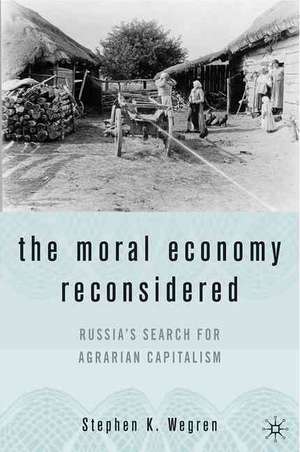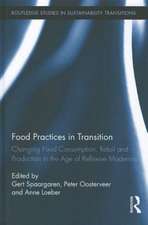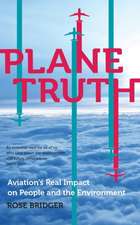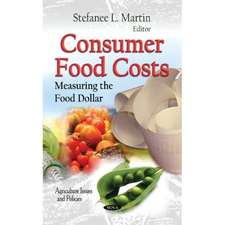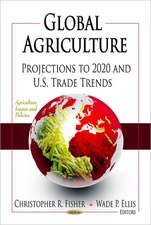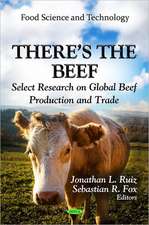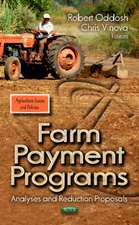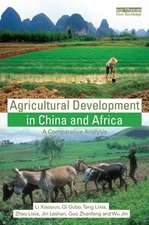The Moral Economy Reconsidered: Russia’s Search For Agrarian Capitalism
Autor S. Wegrenen Limba Engleză Hardback – 6 sep 2005
| Toate formatele și edițiile | Preț | Express |
|---|---|---|
| Paperback (1) | 385.08 lei 6-8 săpt. | |
| Palgrave Macmillan US – 9 noi 2015 | 385.08 lei 6-8 săpt. | |
| Hardback (1) | 389.31 lei 6-8 săpt. | |
| Palgrave Macmillan US – 6 sep 2005 | 389.31 lei 6-8 săpt. |
Preț: 389.31 lei
Nou
Puncte Express: 584
Preț estimativ în valută:
74.51€ • 77.19$ • 62.18£
74.51€ • 77.19$ • 62.18£
Carte tipărită la comandă
Livrare economică 21 martie-04 aprilie
Preluare comenzi: 021 569.72.76
Specificații
ISBN-13: 9781403969507
ISBN-10: 1403969507
Pagini: 278
Ilustrații: XIII, 278 p.
Dimensiuni: 140 x 216 x 20 mm
Greutate: 0.45 kg
Ediția:2005
Editura: Palgrave Macmillan US
Colecția Palgrave Macmillan
Locul publicării:New York, United States
ISBN-10: 1403969507
Pagini: 278
Ilustrații: XIII, 278 p.
Dimensiuni: 140 x 216 x 20 mm
Greutate: 0.45 kg
Ediția:2005
Editura: Palgrave Macmillan US
Colecția Palgrave Macmillan
Locul publicării:New York, United States
Cuprins
Russia's Agrarian Question in Historical and Contemporary Context Why Peasants Adapt: Origins of Behavioral Change under Yeltsin How Peasants Adapt: Large Farms and Farm Managers How Peasants Adapt: Rural Households Effects of Adaptation and Sources of Rural Revival Peasants' Moral Economy and Implications for Russia's Agrarian Capitalism
Recenzii
"Contrary to the doomsayers, Wegren finds a great deal of social change in the Russian countryside. This in-depth and very carefully crafted research project, covering more than fifteen years, shows that if we look at the actual behavior of farm managers and ordinary rural residents they are reacting to reform much like we would expect rational actors to do. This work provides us with some genuine hope for the future of rural Russia." - David J. O'Brien, Professor of Rural Sociology, University of Missouri-Columbia
"This is an ambitious and critically important reconceptualization of traditional theories of rural change and overturns our understanding of agrarian reform in Russia today. Rejecting conventional views of peasants and rural dwellers as isolated, conservative, collectivist, and anti-market, Wegren finds them to be individualistic, "rational," adaptive, even opportunistic, and, when historical circumstances or government reformers have offered economically realistic alternatives and incentives, very willing to take advantage of market-oriented possibilities. He demonstrates not only that contemporary reform has produced significant, market-oriented changes in the contemporary Russian countryside but also that actual outcomes have diverged markedly from the expectations of both government and observers, so much so, indeed, that he considers Russia's future agricultural development to lie with the reconstructed collective and state farms. All subsequentstudents of these subjects will, perforce, have to take notice of this compelling work." - David A.J. Macey, Middlebury College
"A major virtue of this volume is the comparison of Russia's rural economy with other transition countries. At the heart of the book, however, is an examination of the fundamental character of peasant economy and polity. Wegren f rames this question as a conflict between the age old "moral economy" of the peasants and commercial market farming. Karl Polanyi described the same phenomenon many years ago as a clash between economies that were embedded in local social relations and rational peasant responses to "price making markets." This volume will generate some welcome controversy again in the general field of rural studies. Wegren makes a very strong case for his view and backs it with solid empirical data." - James R. Millar, Professor of Economics and International Affairs, George Washington University
"This is an ambitious and critically important reconceptualization of traditional theories of rural change and overturns our understanding of agrarian reform in Russia today. Rejecting conventional views of peasants and rural dwellers as isolated, conservative, collectivist, and anti-market, Wegren finds them to be individualistic, "rational," adaptive, even opportunistic, and, when historical circumstances or government reformers have offered economically realistic alternatives and incentives, very willing to take advantage of market-oriented possibilities. He demonstrates not only that contemporary reform has produced significant, market-oriented changes in the contemporary Russian countryside but also that actual outcomes have diverged markedly from the expectations of both government and observers, so much so, indeed, that he considers Russia's future agricultural development to lie with the reconstructed collective and state farms. All subsequentstudents of these subjects will, perforce, have to take notice of this compelling work." - David A.J. Macey, Middlebury College
"A major virtue of this volume is the comparison of Russia's rural economy with other transition countries. At the heart of the book, however, is an examination of the fundamental character of peasant economy and polity. Wegren f rames this question as a conflict between the age old "moral economy" of the peasants and commercial market farming. Karl Polanyi described the same phenomenon many years ago as a clash between economies that were embedded in local social relations and rational peasant responses to "price making markets." This volume will generate some welcome controversy again in the general field of rural studies. Wegren makes a very strong case for his view and backs it with solid empirical data." - James R. Millar, Professor of Economics and International Affairs, George Washington University
Notă biografică
STEPHEN WEGREN is an Associate Professor in the Political Science department at Southern Methodist University, USA.
